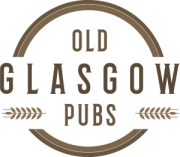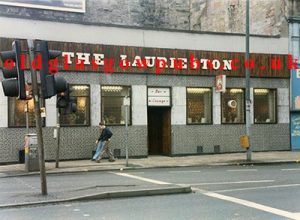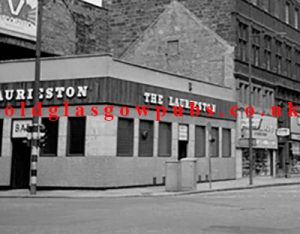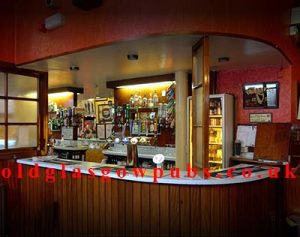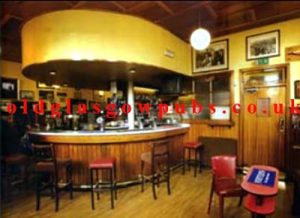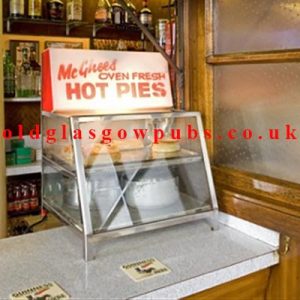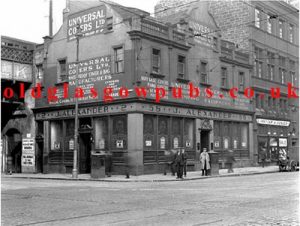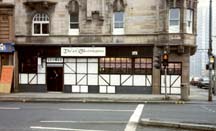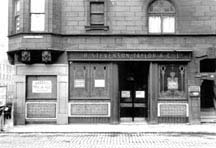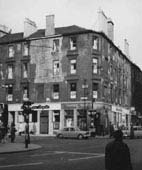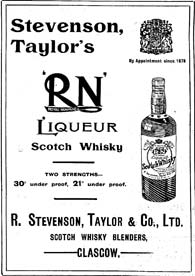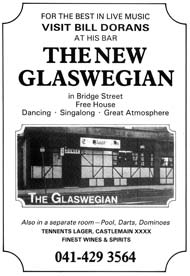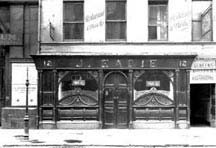24 Bridge Street, Tradeston, Glasgow. Tel: 01414292544.
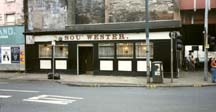
Sou Wester. 1991.
To read the full history of this pub click here.
In the News 1972…
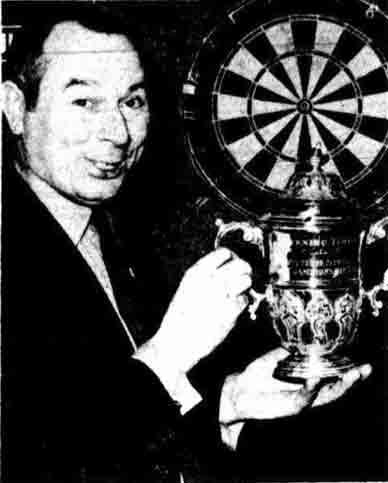
Honest Harry’s A Dart “Shark”
He sweat for £1 an ounce.
The world of the darts player is not everyone’s cup of tea. It is a world thick with cigarette smoke, redolent of beer. It is usually a small world, confined to one corner of a busy bustling bar; a tiny amphitheatre of effort and endeavour.
Yet for the fanatics and there are thousands of them it is a competitive world they thoroughly enjoy. From the “backwoods” bars and clubs the road may lead up to the halls and championships where £100 may hang on a dart and with it the label champion of champions.
For Harry Heenan of the Sou’ Wester Bar, Bridge Street, Glasgow, there has been such a journey, to the top, to the spotlights, and the title champion of Scotland. But whether he is winning or losing, Harry enjoys his darts; they all in fact enjoy their darts.
All Shapes
They carry them about in hand- fashioned special cases, presentation darts, ordinary darts, sets with Jim Pike barrels, fat barrels, thin barrels, long barrels. In plastic, in metal, in wood. Says Frank Quinn, president of the newly formed Scottish Darts Association. “There must be 1000 different kinds of darts. The variety is quite fantastic.”
Harry Heenan is a product of this world. He has all the assets that make the top player, the eye, the temperament, and the ability to play the pressure dart. With 1000 people watching as you try for the 3100 pay off double that you must hit on the board nine feet away, the pressure can be practically unbearable.
Harry is a “shark” at the game. His 1971 list of titles included the Evening Times Scottish singles championship, the Glasgow singles and doubles, and the singles and doubles of his home “stable” the Sou’ Wester.
Success
Harry is no smart Alec. He is remarkably honest in his assessment of his reasons for liking the game and playing it. He confesses, “You get a lot more out of darts than you have to put into it prizes and pleasure in my case. It’s not like football or any of the demanding games. You don’t have to kill yourself training.
“You don’t have to deprive yourself of anything. You can take a drink and your favourite dish. You can eat cream buns if so inclined. There are some great stout darts players and many fine thin ones. It really is an enjoyable pastime, inexpensive, and rewarding.”
But if Harry talks blithely about the rewards of the game they are certainly not achieved without some sweat and strain. Darts is never a placid affair when the moneys on. When the stakes are in three figures they all sweat. And Harry is no exception, although undoubtedly he keeps his considerable cool by following what he calls his “technique” or approach to the game.
“You’ve get to try to be relaxed,” says Harry, fixing you with unwavering eyes and waving his hands about expressively. “You can’t do your best throwing tensed up, now can you? It stands to reason. You must concentrate too. If you can achieve these two things, that’s half the battle. The rest is the breaks.”
The breaks are the great imponderables, the fractions, in flight that mean the difference between a dart in a double and a doleful expression. Darts crowds understand such things. They are so knowledgeable it’s almost frightening. They are really the championship dropouts, the players who have been beaten on the road to the finals.
They are there to play each and every dart, and the atmosphere at a final would generate enough electricity to keep the South of Scotland Board happy in the present power crisis.
Climax
Harry has lived through such electric storms. In Govan Town Hall on a warm June night last year, in a crackling climax to his best-ever season. Harry, snatching tiny sips of beer between games, and being coaxed and cajoled by a highly partisan home crowd, because the first Glasgow League player to win the Scottish Title.
His two-hour effort took “a year off his life and half a stone off his weight” as he jokingly put it, and won him a £100 cheque, the magnificent “Evening Times” Cup, and two bottles of the best. That’s what Harry, a non-smoking, moderate drinking, 35 year old bar manager, means when he says the game can be rewarding, sometimes at around £1 an ounce.
“Jim Pike, Recognised as one of the great exponents of the game. His many tricks include covering a board with a sheet of paper and hitting selected doubles, trebles, and singles as spectators call them out. Another part of his repertoire is standing with his back to the board using a mirror as a “guide” to throwing.
In the News 1974…
Punchbowl have to fill the Cup…!
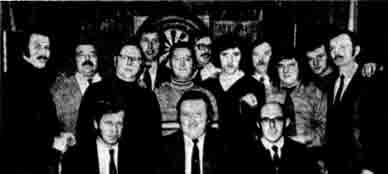
Punchbowl (above) and Sou’ Wester A (below), currently the two strongest teams in the Glasgow Darts Association, had a rare old scrap when they clashed in the final of the White Horse Trophy tournament. Victory went to the Punchbowl 9-8, but only after the two teams had tied it at 6-6 and a best of five games decider had been ordered. 1974.
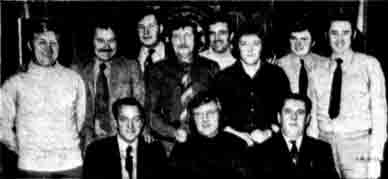
——————————————————————————————————
In the NEWS 1975…
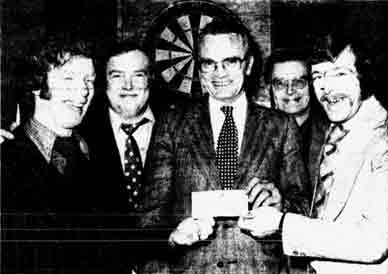
Pictured with a cheque for £140 for the Sharon Lodge Kidney Machine Fund are (left to right) Alex McDonald of Rangers; Willie Scott, Sou Wester Bar; Tony Hanlon, managing director of Kinglass Wines and Spirit Ltd; David Wills, the firm’s sales manager; and Dixie deans of Celtic, who also took part in the pro-am darts tournament The tournament raised £70 which was doubled by Kinglass Wines and Spirits Ltd to make the £140 total.
The Sharon Lodge kidney machine fund faced tragedy this week.
The organisers of the fund had intended to give surplus cash to help buy a machine for a 14-year-old boy from Garthamlock, Glasgow. But the boy, James McEleney, died on Wednesday.
Now all cash left over after paying for a kidney machine for 12-year-old Sharon from Barlanark, will go to the kidney unit of the Sick Children’s Hospital, where it will help to buy other machines.
Darts match
With just over a week of fund to run, the total stands at more than £4690. Of this figure, more than £1200 has been passed on by the “Evening Times” on behalf of readers, factory workers, and other groups who sent in cash.
The latest donation came from the Auew Club in West Regent Street in the city centre. Last night they held a “Pro-Am” darts tournament involving club members and Rangers and Celtic footballers.
And Alex Ferguson, the St Mirren club manager who also runs a Public House, was there to pass on cash collected in his pub. Money also came from the employees of raincoat manufacturer P. Zolkwer and son in the Queenslie Industrial Estate.
They raised the money by holding raffles during their tea break and at their annual dance last week. Money has come in from D.R.G Lairds Packing in Pollokshaws, Glasgow, workers at the Prestcold factory in Hillington, and Lenzie Union Church Sunday School.
The sergeants mess at the 51st R.A.O.C. base in Woodgreen Avenue, King’s Park, gave £51. They raised this by holding a competition games night with the regulars of the A.A. Bar in Kinning Park. Albion Motors have also sent in cash as have two school classes, 7C of St. Sixtus primary and 7B of Thornwood primary.
On Sunday, a police football team from the Northern Division will take on a team supplied by Celtic in a fund raising game at Shettleston Juniors park with a 3 p.m. kick-off. Before the match, which will be attended by Radio Clyde Djs, there will be a display of dog-handling.
The fund closes on March 24 with a dance in the Celtic Social Club’ One of the organisers of the fund Mrs Ruby Gourlay, said, “The support for the fund has been tremendous.”
————————————————————————-
In the NEWS 1975…
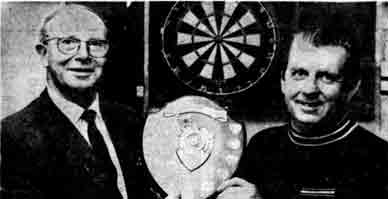
Mr william Keaney (right), mine host of the Sou Wester, Bridge Street, Glasgow, with the new Whitbread Four-Man Shield put up for annual competition between darts teams from the Sou Wester and the Quaich. Company representative Mr Harry Anderson made the presentation., 1975.
————————————————–
In the NEWS 1976…
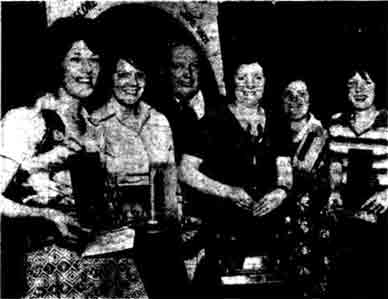
Trophy night for the winners of the Glasgow woman’s darts league at the final of their competition for the Kensas Club Darts Trophy in the Grosvenor Hotel, Glasgow.
Winners were the Garfield Hotel team from Stepps, who beat the girls from the Sou Wester Bar, Gorbals, Glasgow.
Left to right are winners Nancy Taylor, Carol McKerron, Gil Brodie, area manager for Gallaher cigarettes, Margaret Devlin (team captain) and Janet Taylor. 1976.
also see…
